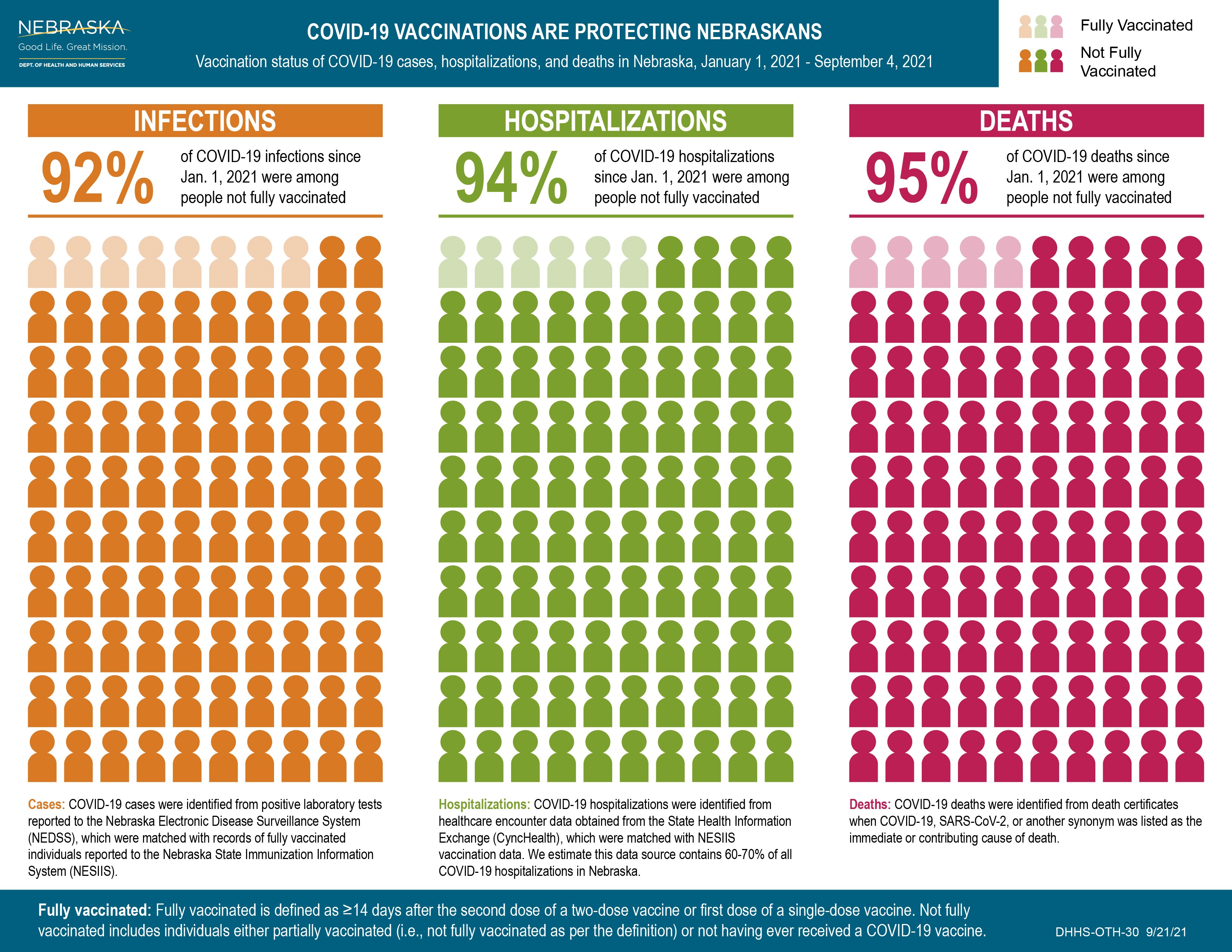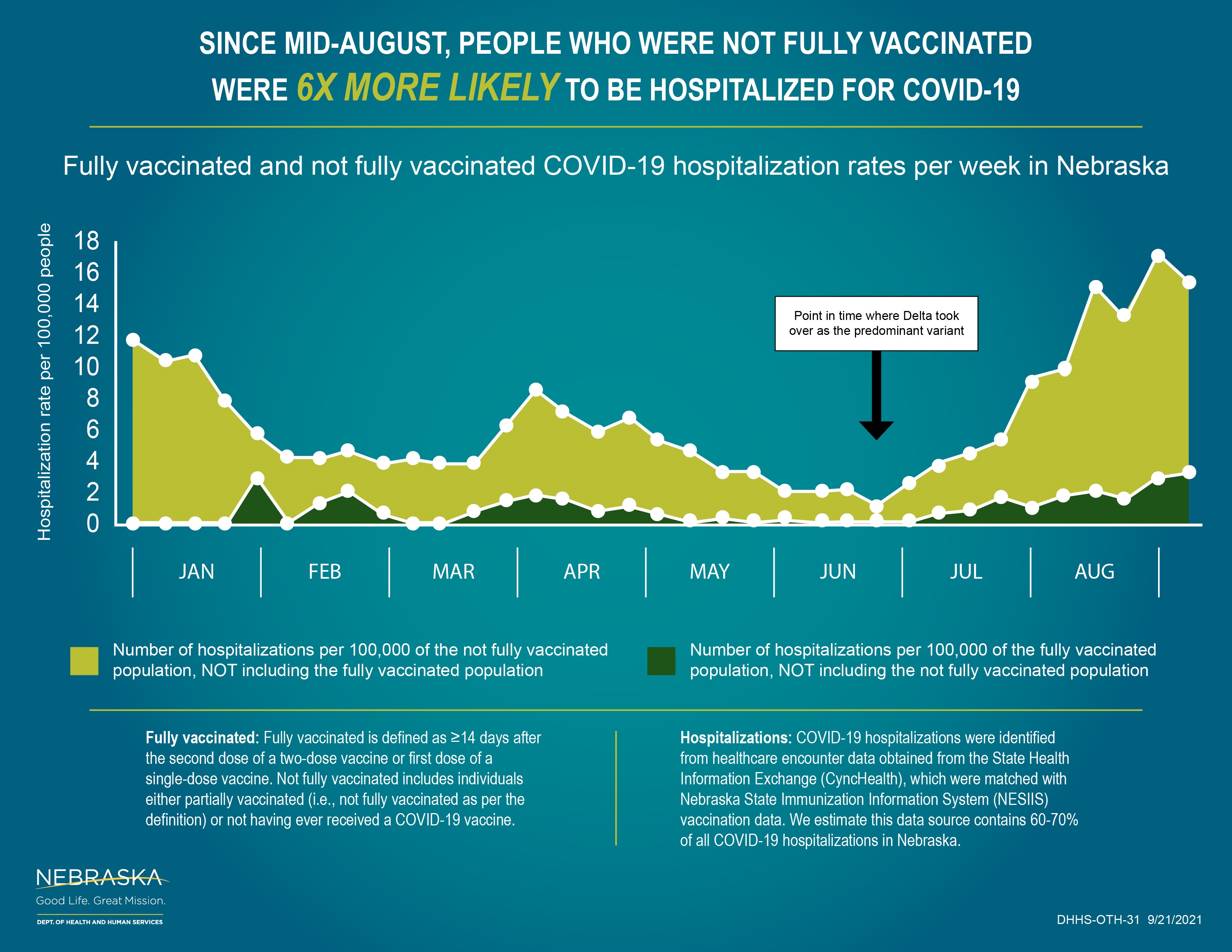CONTACT
Olga Dack, Office of Communications, (402) 840-0711,
olga.dack@nebraska.gov
Lincoln – On Thursday, September 23, 2021, Center for Disease Control and Prevention (CDC) issued a recommendation for a booster shot of the Pfizer-BioNTech COVID-19 vaccine in populations who are at highest risk for COVID-19. The CDC announcement follows the Food and Drug Administration (FDA) authorization of the use of Pfizer-BioNTech's COVID-19 Vaccine on September 22, 2021. Vaccine booster doses are to be administered at least 6 months after completion of the primary Pfizer vaccine series.
The FDA authorization and the CDC guidance will allow many Nebraskans who received the Pfizer vaccine their initial vaccine early in the vaccination program to benefit from additional protection. Although no vaccine offers foolproof protection against the virus, with the Delta variant's dominance as the circulating strain and cases of COVID-19 are increasing across the United States, booster shots will help strengthen protection against severe disease in those populations who are at high-risk for exposure to COVID-19 or the complications from severe disease.
The FDA has authorized and the CDC recommended the booster shot for people who received the Pfizer vaccine in the following categories:
The CDC made additional announcements:
- People 18-49 years, including pregnant women, with underlying medical conditions are recommended to weigh their individual benefits and risks.
- People who are at increased risk for COVID-19 exposure and transmission because of occupational or institutional setting, including frontline workers, such as teachers and healthcare workers. CDC plans to issue additional guidance for occupational exposure.
The State of Nebraska's guidance encourages individuals to have a conversation with their doctor about the vaccine booster.
CDC is currently assessing whether immunocompromised individuals who received an additional vaccine dose (three doses total) will need a booster (bringing them to four doses). More information will be provided by the time immunocompromised individuals would need to receive their booster shots (not until February 2022 at the earliest).
At this time, self-attestation is sufficient for an individual to get a booster shot; no documentation is necessary.
Guidance for Moderna and Johnson & Johnson Vaccines to Be Addressed
Pfizer was the first vaccine to be authorized for use, so data on its ongoing effectiveness were also available first. In the coming weeks, CDC plans to evaluate available data and make additional recommendations for people who received the Moderna or Johnson & Johnson vaccines. CDC Director Dr. Rochelle P. Walensky commented, “Today, ACIP only reviewed data for the Pfizer-BioNTech vaccine. We will address, with the same sense of urgency, recommendations for the Moderna and J&J vaccines as soon as those data are available."
Vaccine Effectiveness
Vaccines have been shown to be effective in reducing risk of severe disease, hospitalization, and death, including against the Delta variant. A small percentage of people who are fully vaccinated will still get COVID-19 if they are exposed to the virus that causes it. These are called vaccine breakthrough cases.
Data obtained from State Health Information Exchange and Nebraska State Immunization Information System (NESIIS) show that Nebraskans who are not fully vaccinated are 6 times more likely to be hospitalized with COVID-19.
Dr. Matthew Donahue, Nebraska's Acting State Epidemiologist, comments, “COVID-19 vaccinations are making a significant impact in our state. Our data tells the full story – people who are not fully vaccinated are filling our hospitals with COVID-19 infections. Vaccinations protect ourselves, our families, and our neighborhoods. They're keeping people safe, preventing illnesses, and keeping us out of the hospital."
The following infographics are based on current data and are visual representations of how effective COVID-19 vaccinations have been in protecting Nebraskans from severe illness, hospitalization, and death.


Booster doses are common for many vaccines. CDC and the scientific community continue to monitor the safety and effectiveness of COVID-19 vaccines, watch for signs of waning immunity, and assess how well the vaccines protect against new mutations of the virus across age groups and risk factors in order to ensure appropriate recommendations for all populations.
DHHS continues to share new information via the Coronavirus website, as well as Facebook and Twitter. For more information about vaccinations or how to get vaccinated, talk to your healthcare provider or visit COVID-19 Vaccine Information page.